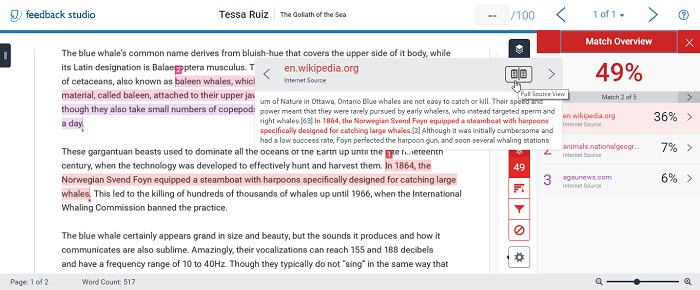

Most plagiarism checkers are only able to detect “ direct plagiarism”, or instances where the sentences are exactly the same as in the original source. Therefore, these plagiarism checkers are not very accurate, as they miss a lot of plagiarism. Many free plagiarism checkers only check your paper against websites – not against books, journals or papers previously submitted by other students.
TURNITIN PLAGIARISM CHECKER FREE DOWNLOAD SOFTWARE
Plagiarism checkers work by using advanced database software to scan for matches between your text and existing texts. The accuracy is determined by two factors: the algorithm (which recognizes the plagiarism) and the size of the database (with which your document is compared). Many free plagiarism checkers fail to detect all plagiarism or falsely flag text as plagiarism. Per our in-depth research, Scribbr is the most accurate plagiarism checker. In this case, you can get your hands upon other good plagiarism detection tools like I discussed in the previous articles. Unfortunately, you can not get access to a Turnitin account if you are a student, independent teacher or a researcher. The accuracy depends on the plagiarism checker you use. Turnitin is a plagiarism checker made for universities and institutes. However, it’s up to you to ensure the information they provide is reliable and accurate.Īlways make sure to properly cite your sources to avoid plagiarism. Primary sources are often considered the most credible in terms of providing evidence for your argument, as they give you direct evidence of what you are researching. If you use one of these in your research, it is probably a primary source. Some types of source are nearly always primary: works of art and literature, raw statistical data, official documents and records, and personal communications (e.g. Are you directly analyzing the source itself (primary), or only using it for background information (secondary)?.Does the source provide original information (primary), or does it summarize information from other sources (secondary)?.Was the source created by someone directly involved in the events you’re studying (primary), or by another researcher (secondary)?.To determine if a source is primary or secondary, ask yourself: Business schools will focus on your past work experience and future career prospects, and may be particularly interested in any experience you have managing or working with others.Medical schools are interested in your personal motivation, qualities such as integrity and empathy, and how you’d respond to common ethical dilemmas.Research programs will often ask what topics you’d like to research and who you would like to work with, as well as specific questions about your research background.Understand what the program is looking for and come up with anecdotes that demonstrate why you are a good fit for them.ĭifferent types of programs may also focus on different questions: Try to stay away from cliche answers like “this is a good program” or “I got good grades in undergrad” and focus instead on the unique strengths of the program or what you will bring to the table. Graduate schools often ask questions about why you are interested in this particular program and what you will contribute.


 0 kommentar(er)
0 kommentar(er)
